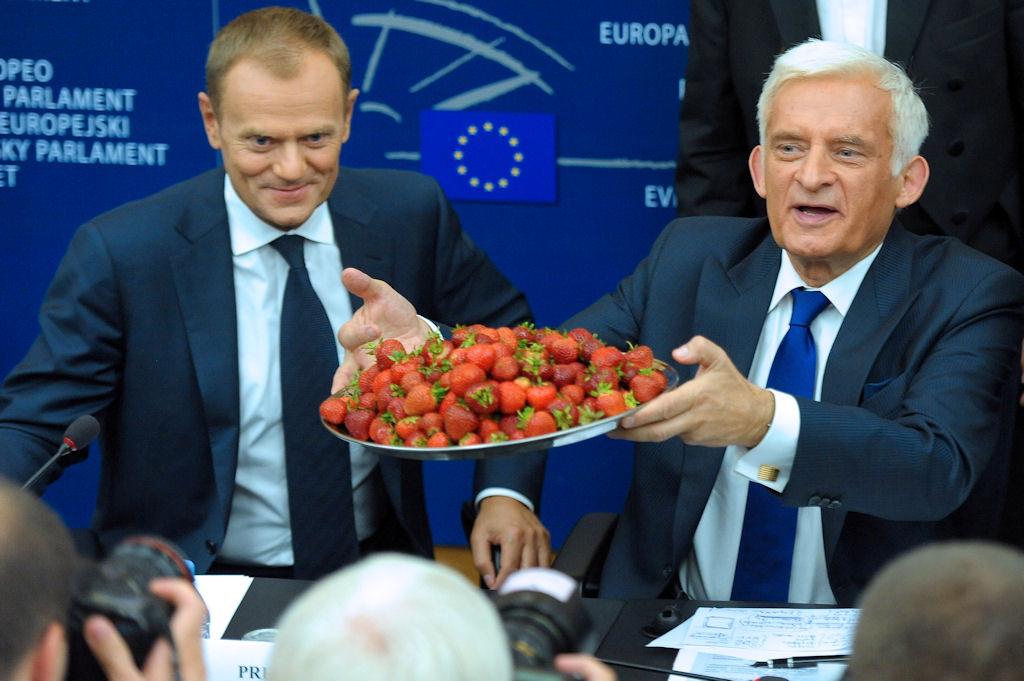Europe: The rosy view
European Parliament President Jerzy Buzek (right) flanked by Polish Prime Minister Donald Tusk (left) presents a tray of strawberries as they give a press conference during a plenary session of the European Parliament on July 06, 2011 in Strasbourg, France.
WARSAW, Poland — The European Union is plunging from crisis to crisis, with Greece on the verge of bankruptcy, Portuguese credit downgrade to "junk" status, and nationalists rising in other countries worried they'll have to pay the bill. Alongside the economic crisis, EU countries have been in a tiff over border control, threatening the Schengen borderless travel zone. Poland, however, is bucking the anti-EU trend, calling for a renewed sense of union as it takes over the bloc's rotating six-month presidency.
“I am convinced that the medicine for the crisis is 'more Europe,'” Prime Minister Donald Tusk told the European parliament earlier this month. “I am convinced that during our presidency we will give the union a lot of our positive energy.”
The EU could use a shot of positive thinking, but Poland is acting in its own strategic interests. It joined the EU in 2004 not to take part in an inward-looking and failing enterprise, but to be part of a forward-looking grouping of states. Its EU membership was supposed to give Poland and other former members of the Soviet bloc the security and economic freedom to finally rejoin the European mainstream after the destruction of World War II and more than four decades of communism.
When Poland joined, the EU had just finished its epochal project of introducing a common currency to more closely bind the economies of its member states, and was broadening the Schengen zone. The union was still open to new members, putting the finishing touches on accession for Romania and Bulgaria and seriously considering allowing Turkey to join.
On joining, Poles and other central Europeans were able to work without restrictions in Britain, Ireland and Sweden, and the number of accommodating countries grew steadily, setting off one of the largest ever waves of peacetime migration as millions of easterners built new lives for themselves in the west.
But the EU has changed dramatically in recent years, becoming less open to outsiders (in part because of disenchantment over allowing in Bulgaria and Romania), more focused on the crisis of the euro, and backtracking on achievements like Schengen over fears of a flood of migrants from North Africa in the wake of popular revolutions in the Arab world.
“We don't want the Polish unemployed, Romanian beggars, or immigrants from North Africa, or Polish pensions. We don't want Turkey in Europe, we want less Europe,” Barry Madlener, a member of the European Parliament from the nationalist Dutch Party for Freedom responded to Tusk's speech.
Although the EU presidency carries less weight since the passage of the Lisbon Treaty in 2009, which amended the functioning of the EU, the presidency still does have some public relations power, which the Poles are hoping to use to rebuild the vision of a more open and inclusive EU.
Using language that has fallen out of fashion in western Europe, Tusk noted the reason for the EU's foundation — to make war in Europe impossible — and stressed the continued attraction of the European model, something that the Dutch, English and French may no longer remember but which for Poles of his generation was a key driver in pushing them to integrate closely with the EU.
“We sometimes stop believing that this is the best place on Earth, but everyone outside of the European Union knows that this is the best place on Earth,” Tusk said.
To that end, the Poles are trying to put the Greek crisis in perspective, reminding both the Greeks and the wealthy nations of western Europe that Poland went through an even greater economic crisis in the early 1990s, when it shifted from communism to capitalism. It survived thanks to Poland's own deep economic reforms, as well as support from western Europe, which approved a write-down of some Polish debt.
That is the sort of approach that could help the EU scramble back from the current precipice — with the Greeks undertaking reforms, while the west is generous with aid.
“For all those Europeans who spent several decades of their lives in poverty and without freedom, today's crisis seems to be an important challenge, but not an existential one, and not comparable with that other one which we all emerged from thanks to the solidarity of the rest of Europe,”
Tusk said.
To that end, the Poles will use their presidency to push for greater closeness between the EU and ex-Soviet republics like Ukraine and Moldova, strengthening the EU's internal market, improving energy security, while also pressing for as generous a budget as possible during the next seven-year budget cycle, which lasts from 2014 to 2020.
Poland has been the largest beneficiary of the current budget, taking in 67 billion euros ($96 billion), which has transformed Poland into the largest building site on the continent, with hundreds of miles of new highways under construction, dozens of new sewage stations cleaning up the water, new playgrounds next to refurbished schools and gleaming soccer fields scattered around the country.
The goal is to remind western Europe that generosity toward the poorer states of central Europe has paid off for western Europe by creating new markets for their businesses, while binding the continent more closely together.
“Sometimes someone has to give more so that those who need help can repay with interest sometime in the future,” Tusk said.
Jan Cienski is Warsaw Bureau Chief for the Financial Times.
Our coverage reaches millions each week, but only a small fraction of listeners contribute to sustain our program. We still need 224 more people to donate $100 or $10/monthly to unlock our $67,000 match. Will you help us get there today?
